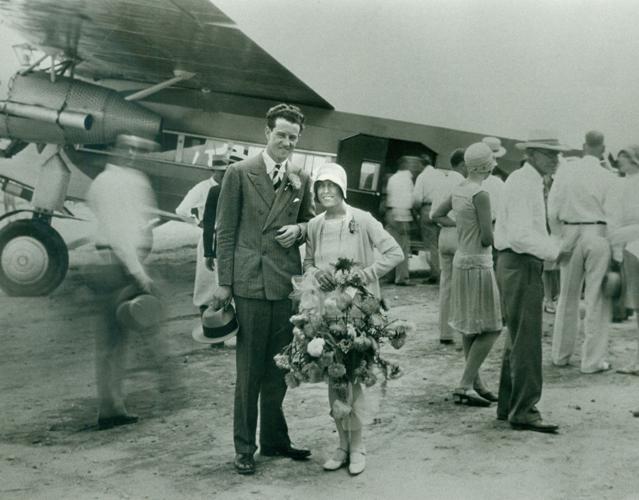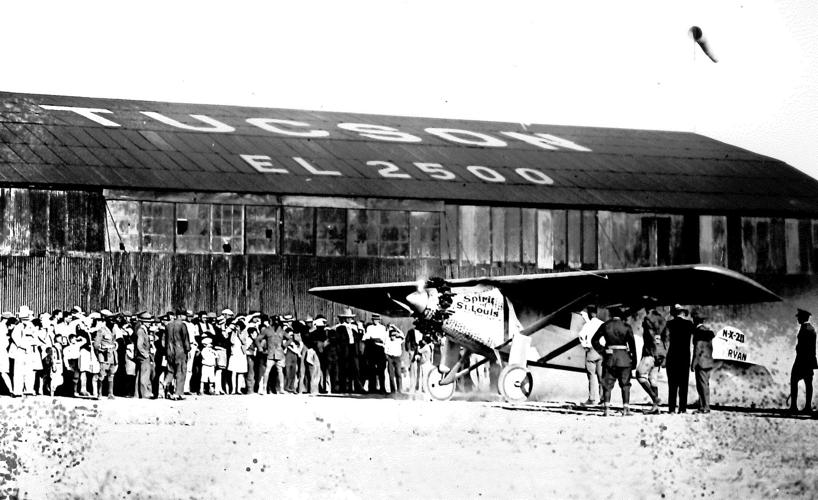Tucson International Airport marked its 90th year of commercial airline service on Tuesday with a reception honoring its longest-serving major carrier, American Airlines.
Commercial airline service began in Tucson on Nov. 28, 1927, with the arrival of a six-passenger Fokker Universal plane flown by Standard Air Lines at the old Tucson Municipal Airport site on land later occupied by Davis-Monthan Air Force Base.
About two years later, American Airlines took over Standard’s route between Tucson and Los Angeles, which included a stop in Phoenix, traveling westbound on Mondays, Wednesdays and Fridays and returning on Tuesdays, Thursdays and Saturdays, according to the Tucson Airport Authority.
The fare for a flight from Tucson to Los Angeles in 1927 was $60, or more than $850 in today’s dollars, the airport authority said.
In April 1928, the airline decided to match the train fare on the route, and airline passenger traffic grew 300 percent.
In 1929, the route through Tucson was extended eastward to Douglas and El Paso, and expanded to become daily flights with a round-trip fare of $52.65, according to the Airport Authority.
The airport hosted combined civil and military operations for decades and was used as a training site for U.S. aviators during World War II.
In 1948, the nonprofit Tucson Airport Authority was formed and the airport moved to its current location. It was renamed Tucson International Airport in 1963, two years after gaining its first flights to Mexico.
American became TIA’s largest carrier in terms of passengers served in 2015, after its merger with Phoenix-based US Airways.
A timeline
Some highlights of Tucson International Airport’s history, focusing on commercial airline service:
• 1927: Famed aviator Charles Lindbergh landed here in September 1927 to dedicate what was called Davis-Monthan Field, before a crowd of 30,000 people. The first commercial flights would start about two months later.
• 1929: New “luxury” 14-passenger Fokker Trimotor aircraft are introduced .
• 1930: American Airlines extends the route eastward from El Paso, to Fort Worth/Dallas, and then to Atlanta (which takes two days to reach).
• 1932: American adds a second daily flight in each direction for four departures daily.
• 1934: After losing the airmail contract between Dallas and Atlanta, American shifts its focus to flying to New York, Philadelphia and Washington.
• 1936: The DC-3, “America’s Largest Land Plane” and the first designed to make a profit solely on passengers and not airmail subsidies, comes to Tucson on American’s transcontinental route. Seats can be converted into sleepers.
• 1940: American Airlines is up to six departures a day from Tucson.
• 1943: American Airlines adds nonstop flights to San Diego.
• 1946: The DC-4 Flagship, a four-engine 44-passenger aircraft, is introduced. Because it can fly farther between fuel stops, it is now possible fly nonstop from Tucson to Dallas and Los Angeles.
• 1948: The Tucson Airport Authority is formed, and American Airlines moves to the new Tucson Municipal Airport and its terminal off Nogales Highway.
• 1949: American Airlines brings the 68-passenger DC-6 — the first airliner with pressurized passenger cabins — to Tucson.
• 1950: American gets its first competition in Tucson with the arrival of Frontier Airlines flying north Phoenix and south to Nogales and Bisbee-Douglas.
• 1956: TWA arrives as Tucson’s third airline.
• 1959: Tucson Municipal becomes the 21st airport in the U.S. to have regular jet airline service when American Airlines introduces 137-seat Boeing 707 “Astrojets” to Chicago and Los Angeles.
• 1961: Two more airlines come to Tucson with the arrivals of Continental and Aeronaves de México.
• 1963: Tucson’s “jet age” terminal opens at the south end of Tucson Boulevard and the airport officially becomes Tucson International Airport. It is served by six airlines with 32 daily departures to 11 nonstop destinations.
• 1984: America West Airlines, based in Tempe, begins service to Tucson.
• 1991: American Airlines opens an 83,000 square-foot reservations center near Tucson International Airport.
• 1994: Southwest Airlines starts service after acquiring discount carrier Morris Air, which launched service here in late 1993 and initially operated as a subsidiary of Southwest.
• 2005: America West becomes US Airways as part of a merger.
• 2015: American and US Airways merge, creating the world’s biggest airline.
• 2017: American Airlines announces it will begin service to Charlotte in February 2018. With the addition, American will connect Tucson to five of its hubs: Charlotte, Chicago O’Hare, Dallas-Fort Worth, Los Angeles and Phoenix.





